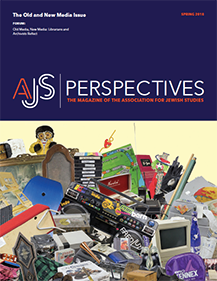Dear Colleagues,
The infusion of new technologies and social media into the world of Jewish Studies has utterly and irreversibly revolutionized the way we approach our scholarly and professional responsibilities. In classrooms and private studies, in libraries and archives, in museums and Jewish communal institutions, new technologies and media do not merely accompany or even facilitate the work that we do; they transform the work that we do.
In my own field of talmudic studies, digital resources make it possible for researchers to check a textual variant at the click of a button, assemble line-by-line synopses of manuscript readings, gain immediate access to Geniza fragments, run word searches through the entire corpus of rabbinic literature, and consult dictionaries, commentaries, and classic works of scholarship without ever needing to check a book out of the library. Certainly, these technologies and media make old tasks faster and easier; but more important, they make entirely new tasks possible. The very fact that large amounts of data can be quickly and accurately gathered, filtered, and sorted according to criteria set by the researcher changes our research questions and as a consequence the very character of our research. (I leave aside for the moment how the ability of students to instantly fact-check every statement in the classroom changes the very character of our teaching!)
The contributors to this issue of AJS Perspectives underscore the promise and possibilities of new technologies and media for Jewish Studies academics, students, artists, professionals, and institutions. Their thoughtful reflections have deepened my appreciation of the riches that stand ready to serve us. At the same time, some of our contributors sound a note of caution, perhaps none so expansively as Ira Wagman in “The Facebook of Life.” Ira’s essay resonated with my own concerns about these new and all-pervasive technologies, especially social media. Simply put, the Internet and the social media platforms it enables are both a blessing and a curse. The blessing of the Internet is its astonishing ability to reach the hearts and minds of millions at the click of a button. The curse of the Internet is its astonishing ability to reach the hearts and minds of millions at the click of a button!
Humans have a less than stellar track record when it comes to partnering intelligence with morality. From atomic fission to surrogate pregnancy, the development and eager embrace of a new technology often occurs before we have had time to consider its ethical implications, let alone develop policies and practices that ensure its deployment for constructive rather than destructive purposes. The Internet and social media are only the latest new technologies to be plagued by ethical dilemmas, including cyberbullying; the viral spread of propaganda, disinformation, and hate; and the disruption of democratic institutions and processes. The abuse of these technologies and their potential negative impact on human relationships as well as social and political institutions has led to the rise of an entirely new field of philosophical inquiry known as cyberethics.
A cyberethicist, I am not. However, one of my first tasks as incoming president of the Association for Jewish Studies was to work with our executive director and board in formulating a set of core values. These core values are intended to guide our interactions internally with one another, and externally with the larger community, as well as other organizations and agencies. Included in these core values are the principles of ethical conduct and good faith (or bona fides), which is the general presumption that members will deal with each other honestly, fairly, openly, and constructively, with mutual respect and a shared dedication to the common good. I believe that extending these values to our use of new technologies and social media in matters pertaining to the AJS will ensure that we maximize the potential of these technologies and media to strengthen our organization: we can utilize them to stimulate constructive dialogue, to share valuable resources, to provide broad access to useful information, to generate new ideas; in short, to build community as we labor together to fulfill our mission as a learned society.
Christine Hayes
Yale University

